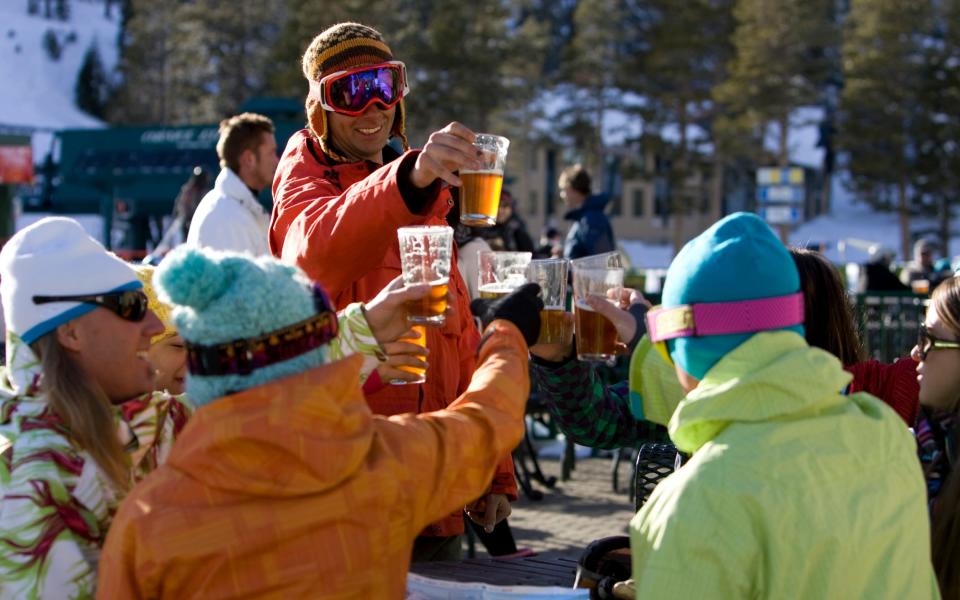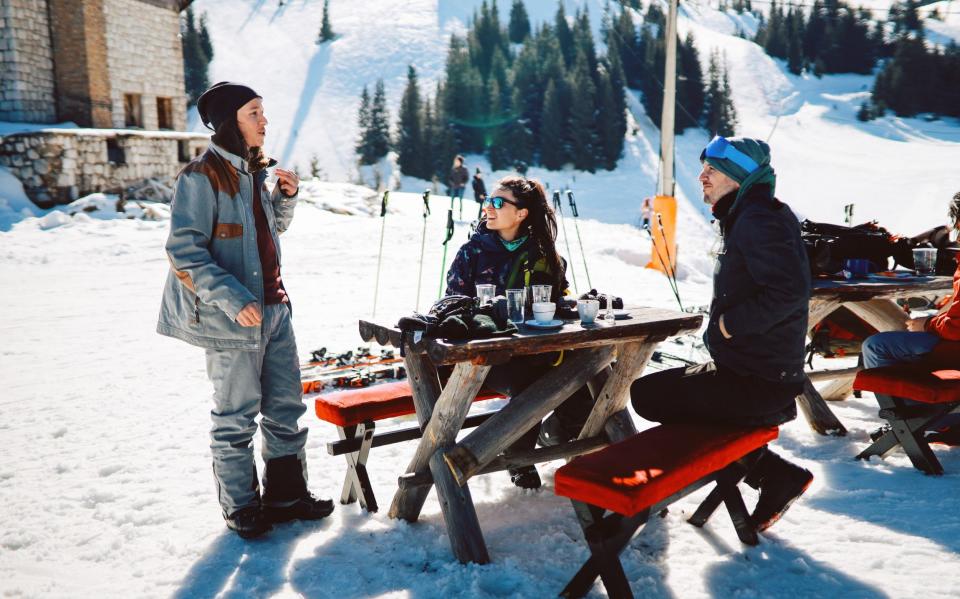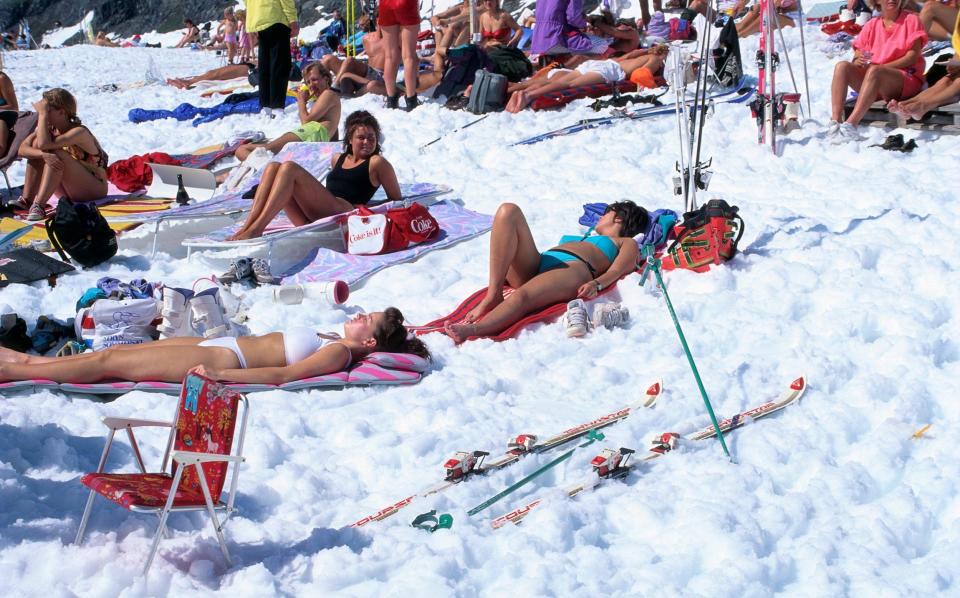I consider myself lucky: when I graduated, I landed straight on the bottom rung of the ladder and steadily climbed towards my dream job. However, a blossoming career did little to quell the pangs of jealousy that struck when I spoke to friends who drifted during various gap years. I grew up eagerly awaiting this rite of passage—my gaze firmly on the snow-capped mountains—but as my adult life galloped along at a rapid pace, I believed the ship had sailed.
Last year, however, chance and circumstances aligned, giving me another bite of the seasonal cherry. With less than a month’s notice, I moved to France to make my ski season dreams come true. This is what I learned about life in the mountains behind closed doors.
1. Work hard, play harder
Is there anything more horrible than someone who can barely afford to eat (the seasonal salary is still around £100 a week) and has to pour vintage Bollinger for a hot tub full of multi-millionaires? Now that I’ve witnessed it, in properties costing more than £150,000 a week, I’m beginning to think not. Within weeks of arriving, I noticed that staff were regularly using alcohol and drugs during shifts to cope with the pressures of delivering such demanding services. The more naive guests were unaware of this debauchery, while the wilder holidaymakers actively encouraged it.
A chalet girl told me that she hides her work uniform in one of the kitchen cupboards. This allows her to party all night and serve breakfast first thing the next morning, before returning home to sleep once her guests head up the mountain. She emphasized that it’s much less painful to make eggs benedict while still trolling than with a killer hangover. A friend, who we called Harry Potter, made himself a small bed under the stairs so he didn’t have to walk back to his accommodation after a night out.


Maximizing recovery time is essential, especially when guests have expectations that border on insanity. One group requested that a certain strawberry variety be made available for breakfast. An unfortunate driver had to make a nine-hour round trip to pick them up from a supplier in the south of France.
2. Relationships are catalyzed
All over the world, dating apps offer near-instant access to anyone who is single or social, but the catchment area in my small mountain town is bordered by the mountains themselves – a few swipes and it’s game over.
Budding relationships are intensified by this closeness and develop at an accelerated pace during the short season. I continue to be amazed at how guests, who are only here for a week, make time for small talk.
A few weeks after my adventure, four male friends from out of town came for vacation. Despite their long-term relationships in London, they all hooked up with other women. Much to the amusement of the rest of us, a member of the group was cornered in the same après bar by two of these newly acquired flings.
Do relationships born in the mountains last? It may be too early for me to say for sure, so I’ll rely on my English ski instructor confidante (let’s call him…) David and his expertise: no, generally not.
3. A different hierarchy applies
In the mountains a different social order is at play: ski instructors are king, ski patrollers are princes, night bands are court jesters, while non-skiers are merely peasants.
Certain trendy resorts attract many people who want to be seen rather than skiing; they walk into equally fantastic restaurants looking like they’ve fallen off a page of Tatler. In normal life, these people, dripping in furs and diamonds, usually have high status, wealth and power. Here they are just wimps.
One afternoon I saw one of my favorite pop stars drinking shots in a bar halfway down a black run. I love his music, but lost all respect for him when I realized he took the chairlift there and back.


However, to some extent, money will always equal power. Another group, who arrived by helicopter, confided to me over champagne and oysters that their concierge had offered to provide escorts even though their wives and girlfriends were with them. Another concierge worker I spoke with sounded traumatized as he recounted the night he was asked to call and dump a guest’s boyfriend. Apparently she wanted to enjoy her evening and couldn’t handle the phone call herself.
4. Misbehaving has become normalized
Is it the height, the adrenaline or the majesty of the mountains? Maybe this otherworldly winter wonderland will give people the freedom to behave differently than they do at home. Stories of all-night parties resulting in destroyed chalets are so common that I pay less and less attention to them as the season progresses.
Another ski instructor I once dated told me that he regularly lets women put their hotel room keycard in his pocket or inquire about the cost of an overnight lesson. I asked David if this has happened to him: “Not yet,” he replied, somewhat disappointed.
At the more youthful end of the spectrum, I met a group of men in their thirties, all with well-paid and important jobs in Britain, doing parkour in the middle of the night, in freezing temperatures. I watched in amazement as they in turn ran into a huge pile of snow left by the piste bashers before belly flopping in.


5. The economics don’t make sense – but it’s worth it
During my time here I have met seasonal workers of all ages – from teenagers to the over 70s. The main caveat to this brilliant life is that for many, housing is, to put it frankly, bleak and the economics simply don’t add up. Unless accommodation and food are included in your job, you’ll struggle – a carton of eggs costs around £3.80 in Alpine supermarkets.
A group of nannies cheerfully told me that six of them are crammed into a room with one small bathroom to share. I estimate their average age at 23 years. They didn’t seem too concerned – most young people can get by on their own thanks to wage increases from mom and dad’s bills – and their youthful optimism is admirable.
My lack of maturity turned out to be a significant advantage, both emotionally and financially. If you can afford to do it right, these can be some of the best months of your life.
For the young, it’s chaos, fueled by stressful bosses, heartbreak and bank balances gone bankrupt. But I bet my heated ski gloves will be back next year. With sincere apologies in advance for my savings, I think that is also allowed.